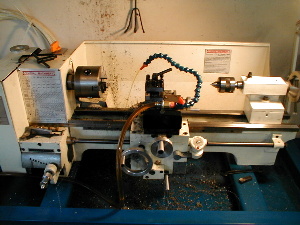The tables are homemade the tools are not. Both tables have
a homemade coolant and sump system. I don’t plan to stay at
the present location for a lot longer.
The equipment will defiantly be moved a few times in the following
years. I made everything on wheels
for easy moving. I will hoist them
up on a flatbed trailer and strap them down when I move. I also like having the equipment on
wheels because I can roll them out to sweep under them. The mill table is made with supports
for drawers that will be added in the future. The drawer rails will mount on the 3 runners and slide in on
the ends. At the present location
I do not have room to open them anyway so I am not in too big of a hurry to
finish.

The mill and lathe I purchased from Harbor Freight tools. Harbor Freight imports the tools from
Asian under the Central Machinery brand.
Many other companies like Enco, Grizzly, Jet, Clarke, Etc. also import
tools of the exact same design.
Many times they are built in the same factory and the only difference is
the paint and label. Harbor
Freight can typically deliver it to your door for less than the other
companies. Their price is almost always less and they also offer free shipping.
There does not seem to be any importers that are guaranteed of consistent
higher refinement or quality but it is worth checking into at the time of
purchase. These imported tools are
not the highest quality or best tools around. I do believe they are a good value around for a hobbyist or
possibly small production use.
They are much less expensive and less quality than some of the
“professional” grade. I do someday
hope to purchase some high quality machines but these will work for now. For me
the price more than offsets the lack of refinement for what I need. I can get a shop full of machines for
the price of one of the others.
Some people highly criticize the imported tools I think unjustly. These tools can be great machines if
you fine-tune them where the Chinese did not. It requires a little work but there are many examples out on
the net of how to do such. I have
heard them described as a “kit” and I think that is a good way to look at
it. The lathes especially need a little
work. My mill is a great
machine. It is basically ready to
go out of the crate. Getting it up
on the table from the pallet was not an easy task. It weights about 690 lbs. I got 2- 4”x4”x1/4” steel angles about 8 foot long
each. I cut holes in one leg of
the angle and bolted it to the mounting bolts of the base. I leaned the mill over to get the nut
on the bottom side. This made four
handles protruding about 3 feet that could be grasped easily. I got about 6 of my buddies to lift it
up while another slid and positioned the table underneath. It worked well. If you do not have helpers then
dissembling it may be an option as well.

The Central Machinery 9”x20” metalworking lathe, not too big
but it works for what I need. The 7x10 mini-lathe is a very popular
tool for about ½ the price of the 9x20.
Unless you need 20” between centers like I did you might consider
getting it. I have not had a lot
of time to work much with the machine yet but am eager to use it. If you get it, before you engage the
threading half-nut be sure to deburr the lead screw key slot all the way
across. I did not do this and the
burrs stripped the zinc half-nuts.
Like I said it needs some refinement when you get it.

The mill and lathe were originally both on the workbench table seen in the right of the picture. Thus explains the very heavy construction. That got old quick. I decided they each need their own place and coolant system. I know that the coolant system is not really necessary but I find it very helpful. I am glad that I have it.